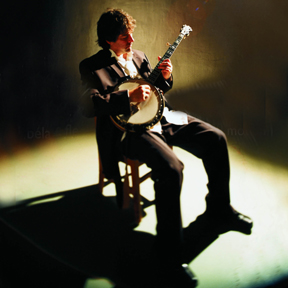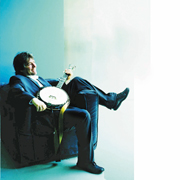|
Pickin' and Grinnin'
Fans who have heard Béla Fleck and the Flecktones' two most recent CDs, Left Of Cool (1997) and Outbound (2000), undoubtedly noticed a new dimension in the group's trailblazing "blue-bop" sound - the addition of Jeff Coffin on saxophone. But those two CDs have represented a more subtle - but also significant - new twist in the way Fleck and his band have approached their music. The first three Flecktones CDs - the self-titled 1990 CD, Flight Of The Cosmic Hippo (1991) and UFO Tofu (1992) - were what-you-hear-is-what-you-get affairs. Even when harmonica player Howard Levy left the group, the remaining trio of Fleck (banjo), Victor Wooten (bass) and Roy "Future Man" Wooten (his personally designed percussion instrument, the synth-axe drumitar) stuck to their live-in-the-studio ethic. "In past years, we really wanted people to know if they heard something on our record, we could play it," Fleck said. "We never would even go in and overdub something and try something different. We'd just try to play it as good as we could, what we could come up with in practice and on tour." That philosophy changed in a big way with Left Of Cool, the first Flecktones CD to feature Coffin on saxophone. By that time Fleck said he had begun to worry that the group would begin to sound like a broken record if they didn't change their approach to recording. The studio became a tool to bring new dimensions to the band's sound. "On Left Of Cool, we actually doubled and tripled and quintupled ourselves," Fleck said. "If I wanted to play guitar and mandolin on a track, I'd go back [and play them]. If Jeff wanted to record a horn section, he would play all the horns. If Victor wanted to try some extra bass parts, he would do it. That was the first time we had done that." The result was a CD that reshaped perspectives on the trademark sound of Béla Fleck and the Flecktones. To be sure, the songs on Left Of Cool still explored the group's signature fusion of bluegrass and jazz (hence the term "blue-bop"). But where the band's sound had been especially spare on the 1993 CD Three Flew Over the Cuckoo's Nest (the only album recorded as a trio of Fleck and the Wooten brothers), Coffin's saxophone and other wind instruments expanded the range of sounds and textures in the group's sound. Especially on tunes like "Communication," Coffin's saxophone put a slicker, more contemporary jazz edge on the Flecktones sound - although Fleck's banjo and the funky rhythms supplied by the Wooten brothers ensured that the group wouldn't entirely lose the earthy accent on their sound. With Outbound, which just won a Grammy for best contemporary jazz album, the group took another new path in expanding on the sound of the group. Where Left Of Cool had involved only the four band members, this time a host of guest musicians were invited. The diverse roster of 17 guests includes King Crimson guitarist Adrian Belew, keyboardist John Medeski from the jazz-funk trio Medeski Martin & Wood, horn player Paul McCandless, bassist Edgar Meyer and singers Jon Anderson of Yes and Shawn Colvin. "Left Of Cool - it really was Jeff's first record with us," Fleck said. "If we just went in and recorded with the four of us again, there was an inevitability of it having a lot of similarities to the last record. And so if you start making multiple records with the same exact people, you're looking for ways to change the rules so it doesn't all sound the same. And with this record, we threw the floodgates open to a lot of musicians that we just loved and we wanted the chance to collaborate with - people who we thought deserved to be known better." The guests certainly make their presence felt on Outbound. On songs like "Hoe Down," "Aimum," "Lover's Leap" and "A Moment So Close," the sound swells at various moments with contributions from the Love Sponge String Quartet, vocalists and additional instrumentalists. With so many guests joining in the fun, the challenge, of course, was how to keep the Flecktones distinctive sound from getting lost in the crowd. "Well, it was a very important issue," Fleck admitted. "This was our first record for Sony, so you kind of want to establish the group. And making it totally collaborative would have been the wrong thing to do. So we were looking for all of these friends and musicians who could color in the music while leaving us the predominant soloists. Actually, I think we succeeded in that way... I think we kept the band featured and everybody got a lot of good, strong featuring. But I also think we explored the studio and the things that we can do in the studio with a bunch of different instruments and different colors." As Fleck noted, Outbound is the first project under a multi-faceted contract Fleck signed with Sony Music in 2000 following a decade-long stint with Warner Bros. Records. The deal includes a second CD on Columbia Records with the Flecktones, two CDs for Sony Music's classical division and a solo jazz album. To Fleck, the end of his contract with Warner Bros. represented a rare opportunity to test the market and see what opportunities might be offered by other labels. "When the Warner Bros. contract started to run out, they had talked to us about renegotiating a couple of years earlier because they thought it would be a wise decision for them to secure us again before our contract ran out," Fleck said. "We didn't want to [renew]. We wanted to see what we would be worth to a record label, a new one. We wanted the opportunity after having signed with them before the band even started - that (Flecktones self-titled debut CD) was going to be a solo record I was doing - to have the opportunity after we're established to see, not just what we were worth, but what somebody would want to do with the band." Fleck acknowledged that sales of his CDs with the Flecktones and other projects (such as 1995's Tales From An Acoustic Planet and 1999's The Bluegrass Sessions - Tales From An Acoustic Planet Vol.2) had gone static, and he found this situation troubling. "Warners were really good friends to us," Fleck noted. "They took care of us. They really helped establish the band, especially in the beginning, through that whole period. It was a good thing. But sometimes a new team is a great thing for a band. "Everybody wants to see their stuff do well," he said. "In the last years with Warner Bros., the record sales weren't growing in any [measure], next to the live show, where turnouts were booming and growing measurably almost from month to month. We had huge gains that we weren't seeing with the records, so we wanted to try and get that going too." Fleck's next CD in the Sony contract is likely to be the first of the two classical albums. He had discussed a variety of concepts for the CD, which is partially finished, including recording a combination of original and outside works. Eventually Fleck settled on the idea of recording his interpretations of works by some of classical music's most famous composers. The CD, he said, will help show how the banjo can be adapted to most any style of music - even a genre that might seem as unlikely as classical music. "It ended up being a lot of fun," Fleck said of the classical music project. "We did a Bach (composition) - it's great on the banjo - a couple of Beethoven pieces, a Paganini violin piece, a Tchaikovsky, Chopin... It's all going to be very intimate, small groups. I'm going to record some marimbas, classical guitar, bass and cello and violin. It will really be a different sound." Bela Fleck and the Flecktones play Saturday, September 15 at the Singletary Center. Call 257-4929 for more info. |
|||
|
HOME | THIS ISSUE | ACE ARCHIVES |

